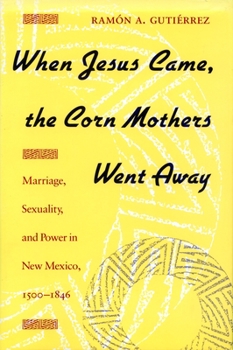When Jesus Came, the Corn Mothers Went Away: Marriage, Sexuality, and Power in New Mexico, 1500-1846
Select Format
Select Condition 
Book Overview
This social history of one remote corner of Spain's colonial American empire uses marriage as a window into intimate social relations, examining the Spanish conquest of America and its impact on a group of indigenous peoples, the Pueblo Indians, seen in large part from their point of view.
Format:Paperback
Language:English
ISBN:0804718326
ISBN13:9780804718325
Release Date:January 1991
Publisher:Stanford University Press
Length:424 Pages
Weight:1.42 lbs.
Dimensions:1.1" x 6.0" x 9.0"
Customer Reviews
3 ratings
Excellent Work
Published by Thriftbooks.com User , 25 years ago
This is an excellent book. While the book has received some criticism, anyone who has read them will realize that they have little value. The passionate nature of the attacks on this book make it obvious that the attitude they are written in is anything but scholarly. It's true that there are assumptions and subtleties that could trouble some people, but they should be no problem for the intelligent and alert reader. Note that most of the things that were questioned about the book were very clearly explained in the introduction of the text.
Valuable, but approach with caution
Published by Thriftbooks.com User , 25 years ago
This book is valuable if for no other reason than its presumption that sexuality has a history, and its tracing of the emergence of modern forms of sexuality thorugh the colonial documents of the Spanish conquest of New Mexico. One should not be seduced by Gutierrez's title into thinking that his text is riddled with pithy and complicated observations about the intersection of race, power and sexuality. Rather, the text itself manifests and speaks quietly of new questions and possible answers to be gleaned from considering colonial conquest as a two-way event; one in which the conqueror is affected as much as the conquered. It is, I think, a radical idea to examine how the symbol/belief system of Pueblo indians interfaced and ultimately facilitated their conquest. Similar, it is interesting to observe the colonialist system of self-other become undermined by conquest, hopelessly buttressed by extreme racist measures, and ultimately falls, playing out an Hegelian dialect- the seeds of destruction are immanent to creation. At the root of the author's project is the notion that people are conquered, subjected, not so much by the sword but by the imposition of discourse, which as Foucault reminds us is always negotiated between power and resistance.
Glimpse of past encounters.
Published by Thriftbooks.com User , 26 years ago
This book in not of the divulgative kind. It is more of a scholarly work. Sometimes too heavy, insistent and lenghty. But it provides a very intersting glimpse in the past of the SouthWest and the conflicts that the encounters between the indians and the spaniards caused. The inability of the spaniards to deal with ancient indian customs in one hand and the church and morals they brought with themselves, remnants of a dying world, in the other, the deception the indians suffered as they applied their own beliefs to the spaniards, the codes and whims that regulated the sexuality of these two vastly different worlds...it all makes for an exciting subject and a great diary of the life in the U.S a long time ago. The author doesn't portray the indians as free of prejudice like they would want us to believe these days, neither are the spaniards just mere enslavers and ill-guided colonists. The views are more balanced and make better sense. Even centering the thesis aroun! d sexual matters was very illustrative and rich.






